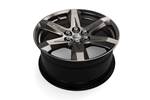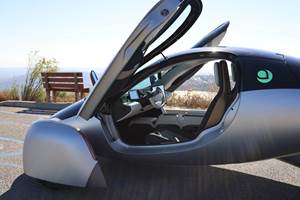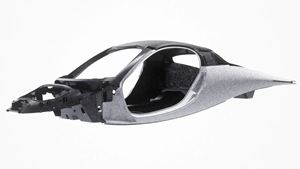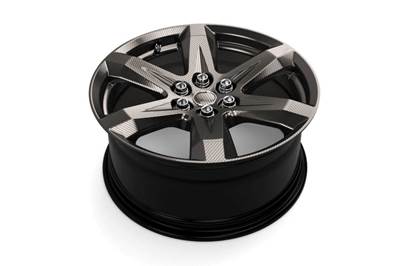Hankuk, Carbon, Dymag partner to scale up manufacturing of state-of-the-art carbon fiber wheels
Hybrid-composite BX-F wheels will serve high-performance road cars, luxury EVs and large SUVs and pickups.
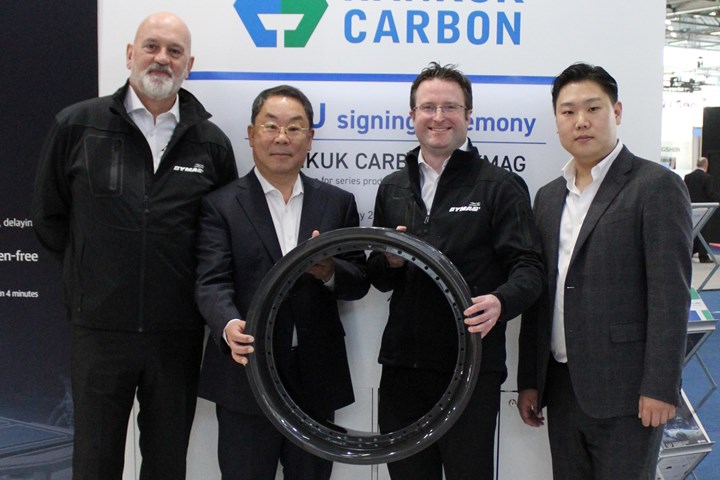
Together, Hankuk Carbon and Demgy expect to enable the mass production of state-of-the-art high-performance carbon fiber wheels for automotive OEMs. Photo Credit: Hankuk Carbon, Demgy.
Hankuk Carbon Co Ltd. (Seoul, Republic Of Korea), manufacturers of advanced composite materials, has formed a strategic joint-partnership with Dymag (Wiltshire, U.K.), known for its carbon fiber composite wheels, to enable the mass production of state-of-the-art high-performance carbon fiber wheels for automotive OEMs.
The collaboration, announced at JEC World 2022, will apply Hankuk Carbon’s expertise in advanced materials and industrialization, leveraging Dymag’s expertise in manufacturing lightweight carbon fiber composite wheels for the high-performance and luxury vehicle markets. Taking a scalable and localized approach, both partners report that this combination of resources and technical expertise will reportedly accelerate time to market.
“We share Dymag’s vision for the growth in the global market potential for high-performance hybrid carbon [fiber] composite wheels and our expertise in composite materials and industrialization will accelerate this,” Hankuk Carbon chairman, Mr. Moonsoo Cho, says. “Together, we will bring automotive OEMs an unrivaled technical and commercial offering for future vehicles.”
Hankuk Carbon has been producing composite materials, including carbon fiber textiles and prepregs, since 1984. The business has grown into an international provider of composite material solutions, with plants in South Korea and Vietnam and global offices in China, the U.K. and Germany. The company provides specialist material solutions for many composite applications, including liquid natural gas (LNG) storage tanks for marine bulk carriers and battery-electric vehicles (BEVs), as well as high-quality prepregs for aerospace, marine and automotive markets. Hankuk Carbon says it provides total technical support from supply of materials through to engineering and the production of the composite solutions.
Said to be leading advanced wheel design since 1974, Hankuk’s latest partner, Dymag, holds a long heritage commercializing carbon fiber hybrid composite automotive wheels. Its wheels feature a carbon fiber rim with a forged aluminum or magnesium centerpiece. Dymag has 15 brands using its technology.
Together, the two companies will work to scale up mass production of Dymag’s BX-F composite wheel, which is said to feature high performance, weight savings in excess of 50% over traditional cast alloy wheels and optimized durability. Additional benefits using Hankuk’s materials will include improvements in vehicle range and noise, vibration and harshness (NVH), reduced unsprung mass and moment of inertia, improved ride and handling and aethetics.
The benefits of Hankuk’s composite material for Dymag’s wheels is applicable to traditional high-performance road cars, high-performance and luxury electric vehicles (EVs) and large SUVs and pickups, which Hankuk says are also becoming increasingly electrified. Dymag wheels are available in sizes of up to 23 inches — rated to 1,000 kilograms (approx. 2,204 pounds) — with larger sizes to follow.
“The price point for these wheels will be appropriate for both luxury and performance-oriented versions of road cars, particularly in the growing high-end EV market, thanks to Dymag’s technology benefits in improving EV range and NVH,” Dymag CEO, Tom de Lange, adds. “For all automotive sectors, the dynamic, durability and aesthetic benefits of carbon [fiber] composite hybrid wheels will become accessible to a larger number of consumers through OEM programs.”
Related Content
Aptera reveals first composite production parts for BinC vehicle
Pre-production efforts are underway to begin building production-intent vehicles.
Read MoreAptera joins forces with C.P.C. Group to accelerate solar EV production
Specialized composite bodies are being produced in Modena, Italy, for Aptera’s BinC vehicle, enabling eventual manufacturing ramp-up of 40 vehicles/day to meet demand targets.
Read MoreBcomp ampliTex makes appearance in Cupra EV Cup Bucket seats
The entire Cupra Born VZ line-up features all-natural fiber front seats that highlight functionality, aesthetics and reduced CO2 emissions.
Read MoreSMC composites progress BinC solar electric vehicles
In an interview with one of Aptera’s co-founders, CW sheds light on the inspiration behind the crowd-funded solar electric vehicle, its body in carbon (BinC) and how composite materials are playing a role in its design.
Read MoreRead Next
Envisioning high-volume, 100% composite wheels
Vision Wheel debuted its first carbon fiber composite wheel at CAMX 2021, claiming its low-cost, high-volume process can be scaled up for performance vehicles, UTVs and — ultimately — passenger EVs.
Read MoreCarbon Revolution meets automotive market demand with lightweight carbon fiber wheels
Twenty-three-inch and 24-inch carbon fiber wheel offerings meet growing EV SUV and truck load requirements with 45% weight savings comparable to aluminum wheels.
Read MoreDeveloping bonded composite repair for ships, offshore units
Bureau Veritas and industry partners issue guidelines and pave the way for certification via StrengthBond Offshore project.
Read More


